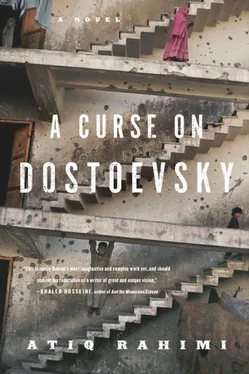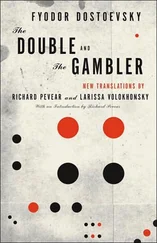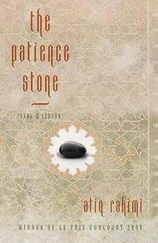Razmodin stares at him. Rassoul keeps his eyes on the ground, not in case he contradicts himself but so that his cousin won’t see he’s been smoking.
Hide as he may, Razmodin is beginning to suspect. That’s why he leans over, checking Rassoul’s dark, evasive eyes for the slightest sign, the slightest gleam to assure him of his cousin’s state. He can’t believe that Rassoul harbors such hatred toward his father.
No, it’s not even hatred but something still more savage: indifference. And worse, not indifference at life itself, but at his father’s death.
No, Rassoul cannot be this cruel, this inhuman. There must be something else going on.
Hash! That’s what it is. Look at his eyes! So red, so lost, so dull…
“Have you been smoking again?”
Here we go!
Rassoul stands up and walks out. The door slams. Razmodin remains alone for a moment, bewildered. Then he comes to his senses and rushes into the corridor. “Where are you going? Commandant Rostam is looking for you.” Rassoul shrugs. What the hell does he care? “He’s come all the way from Mazar-e-Sharif. He was a friend of your father’s… He says he’s going to take care of your mother and sister.” He’d better come back another day. Rassoul is busy. “What’s happening to you, cousin? You’re not saying a word! Tell me what’s going on!” Nothing, Razmodin, nothing! “Are you sick?” No, he shakes his head.
But you are sick, Rassoul, sick of yourself.
Razmodin follows him: “You’ve let yourself go again, not eating, not sleeping…” He takes a few notes and slips them into Rassoul’s pocket. “Promise me you’ll take care of yourself. See a doctor. Eat, rest, recover your strength. I’ll come and check on you…”
Why such contempt for Razmodin, when he is such a kindly cousin?
Because I know why he’s always taking such care of me. It is neither compassion nor friendship. It’s because he too wants to marry my sister. That’s why!
And?
Rassoul leaves the hotel, annoyed.
The street is still thick with smoke, and just as stifling. After a few steps Rassoul comes to a thoughtful standstill. “Who is this fucking Rostam?” He lights a cigarette, and glances across the road to the Ministry of Information and Culture. It is seething with armed men, Jano among them. He sees Rassoul and calls out, “Hey, Rassoulovski!” Rassoul crosses the street. “So you’ve decided, have you? Follow me!” They enter the building, go down the stairs and along a dark, smoky basement corridor until they find Commandant Parwaiz talking to two bearded men around a large map of Kabul. Their voices are muffled by the roar of a generator. Jano walks up to Parwaiz to tell him that Rassoul has come.
“And how is my Dostoevsky scholar? Welcome. You look much younger than last night!” says Parwaiz with his disarming smile. Rassoul strokes his chin to indicate that it’s because he has shaved off his beard. “The beard disgusted you?” Laugh. “And the voice?” Rassoul grimaces. “ Watandar , why didn’t you tell me last night that you were Razmodin’s cousin? We met in prison. So… are you coming to join us?” Yes, he nods, glancing awkwardly at the two men. “They’re with us,” says Parwaiz in reassurance. After a brief silence, on account of his uncertainty about whether or not to say it, and how to say it, Rassoul picks up a pencil lying on the Kabul map and scribbles the name Commandant Rostam on one corner. Parwaiz reads it out and asks him, astonished: “You’re going to join Commandant Rostam?” The two men turn and stare at Rassoul. This makes him even more nervous. One says: “Who doesn’t know him!” and stares hard at Parwaiz, saying: “In fact, I wanted to talk to you about that. People are saying that you want to join forces with him.”
“Yes, but…”
“Tell me it’s just a rumor!”
“Sadly, it’s true!”
“So that’s why he’s in Kabul! And you’re up for it?”
“It’s not for me to decide…”
“Think about what you’re saying, Parwaiz: the day I find out that pig is with us is the day you’ll see me across enemy lines.”
“Commandant Morad, it is better to live in peace with him than…”
“In peace with one’s enemy? Do you believe in peace between a wolf and a lamb?”
“What you are saying is true, but with our enemies we have a duty to make peace; with a friend, there’s no need.”
“But why? You’re well aware that we can’t stand each other! If you want to make peace with him then my place is no longer here with you. Goodbye!”
He takes his gun and strides out. Parwaiz and the other man rush after him. Rassoul remains there alone, distraught, staring at the map of Kabul laid out on the table, crumpled and full of holes.
At this point his sister’s name reverberates inside him—“Donia!”
THE CITY of Kabul is waiting for the wind. It waits for the wind as it waits for the rain to bring an end to the drought. Just five weeks ago, the wind would start blowing before the sun had even disappeared behind the mountains. It would raise all the dust that had covered the city and every inch of people’s lives, and chase it away. That wind arose from none of the cardinal points. You could say it arose at the end of the earth, and to there it returned having whirled around the city to help it breathe, sleep, and dream once more… But it blows no longer. It lets everything stagnate: the sulphur of war, the smoke of terror, the embers of hatred. The fatty stench of burning clings to your skin, seeps into your bones. Better to smoke one of Nana Alia’s cigarettes than to breathe this stifling air.
Rassoul lights up. No desire to go home, or to see Sophia. He is still wandering. Lost.
Perhaps he should find a doctor? With the money Razmodin gave him he could afford the consultation and the medicine, food, and something to smoke.
* * *
At the Malekazghar crossroads he sees a sign for a doctor’s clinic, “Specializing in ear, nose, and throat.” He walks in. The waiting room is full to bursting. Men and women with their families, some who seem to have spent the night there. People are eating, smoking, coughing, shouting, laughing…
At the entrance to the passage, a young man is handing out numbers. He shouts to Rassoul: “You have to arrive very early to get a number—around six in the morning.” Seeing Rassoul’s shocked face, he grumbles: “All Kabul comes here to be treated. Whether they have throat problems or piles! The hospital only takes the war wounded these days, and not all of them!”
Rassoul is about to leave when a woman approaches and says that if he needs to see the doctor urgently she will sell him her number for fifty afghanis. It is number ninety-six, tenth in the queue, “and you’ll see, it goes quick! Fifty afghanis would buy milk and medicine for my child.” Rassoul hesitates, then accepts and waits in the passage for his turn. As he waits he sees the woman sell three more numbers!
As luck would have it, the doctor is very old, and can barely see! This means that despite his hugely thick glasses he has trouble writing out the prescriptions. He tells his patients to speak up. Distraught, Rassoul scribbles “I’ve lost my voice” on a prescription form and holds it out to the doctor, who yells at him to read out what he’s written, then suddenly understands. “Since when?” Three days, he indicates on his fingers. “What caused it?” Silence. “A physical trauma?”
“…”
“Emotional?” Yes, nods Rassoul, after a moment’s pause. “There’s nothing I can give you for that,” says the doctor maddeningly, drumming his fingers on piles of prewritten prescriptions for all kinds of complaints. “The only way to get your voice back is to relive the situation, the emotion. That’ll be one hundred afghanis for the consultation, please.” Then he calls out, “Next!” Before the next patient arrives, Rassoul pays with all the money he has left, and leaves the clinic in a rage to wander again through the unsettled city until nightfall. Then he goes home and sleeps. No nightmares.
Читать дальше












